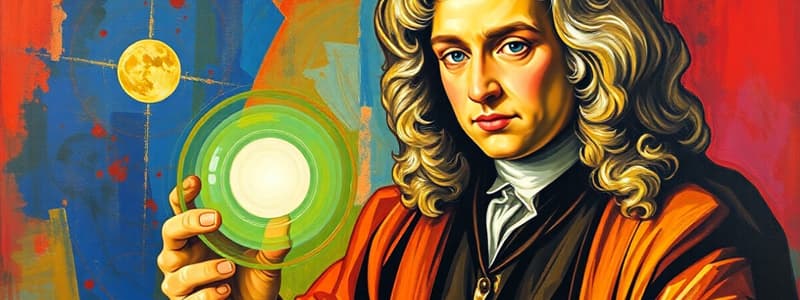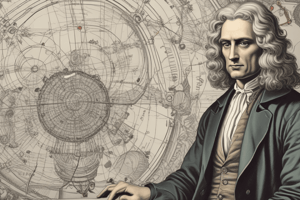Podcast
Questions and Answers
How did the closure of Cambridge University in 1665 influence Newton's scientific development?
How did the closure of Cambridge University in 1665 influence Newton's scientific development?
- It led him to abandon physics in favor of optics, as labs were inaccessible.
- It prompted his return home, where observations catalyzed his theory of gravity. (correct)
- It allowed him to focus on mathematics, unburdened by experimental observations.
- It isolated him from scientific discourse, hindering his progress for several years.
Why does Newton's work qualify him as one of history's paramount scientists?
Why does Newton's work qualify him as one of history's paramount scientists?
- He laid a foundation for understanding motion and gravity. (correct)
- He was the first to quantify the speed of light accurately.
- He invented calculus, a field previously unexplored.
- He disproved the heliocentric model of the universe.
Considering Newton's experiments with light, what was the most significant conclusion he drew?
Considering Newton's experiments with light, what was the most significant conclusion he drew?
- Different colors of light travel at different speeds.
- Light is composed of particles rather than waves.
- Prisms can create colors that are not originally present in white light.
- White light is a composite of multiple colors. (correct)
How did Newton's reflector telescope improve upon existing telescope designs?
How did Newton's reflector telescope improve upon existing telescope designs?
Why was the publication of Newton's Principia considered a pivotal moment in science?
Why was the publication of Newton's Principia considered a pivotal moment in science?
In what way did Newton's position as President of the Royal Society influence scientific discourse?
In what way did Newton's position as President of the Royal Society influence scientific discourse?
How did Newton's Optiks (1704) build upon his earlier experiments with light?
How did Newton's Optiks (1704) build upon his earlier experiments with light?
How did Newton's observation of an apple falling from a tree catalyze his formulation of the law of universal gravitation?
How did Newton's observation of an apple falling from a tree catalyze his formulation of the law of universal gravitation?
What was the prevailing view of celestial motion before Newton's laws, and how did his work challenge it?
What was the prevailing view of celestial motion before Newton's laws, and how did his work challenge it?
Considering his work in both optics and mechanics, what common methodological thread connected Newton's approach to scientific inquiry?
Considering his work in both optics and mechanics, what common methodological thread connected Newton's approach to scientific inquiry?
How did Newton's discoveries regarding light influence the design and functionality of telescopes?
How did Newton's discoveries regarding light influence the design and functionality of telescopes?
What distinguishes Newton's formulation of the law of gravity from earlier understandings of celestial motion?
What distinguishes Newton's formulation of the law of gravity from earlier understandings of celestial motion?
Given that Newton's first law describes inertia, how does it relate to the concept of equilibrium?
Given that Newton's first law describes inertia, how does it relate to the concept of equilibrium?
How did Christiaan Huygens's perspective on the nature of light differ from Isaac Newton's, and what was the basis of their disagreement?
How did Christiaan Huygens's perspective on the nature of light differ from Isaac Newton's, and what was the basis of their disagreement?
In what way did Christiaan Huygens's work on pendulum clocks contribute to advancements in scientific instrumentation and measurement?
In what way did Christiaan Huygens's work on pendulum clocks contribute to advancements in scientific instrumentation and measurement?
How does Newton's second law of motion explain the relationship between force, mass, and acceleration?
How does Newton's second law of motion explain the relationship between force, mass, and acceleration?
How could you apply Newton's third law of motion to describe the propulsion of a rocket?
How could you apply Newton's third law of motion to describe the propulsion of a rocket?
What did Newton's study of light reveal about the nature of white light, and how did it change scientific thinking?
What did Newton's study of light reveal about the nature of white light, and how did it change scientific thinking?
What was the key finding that resulted from Newton's experiments using prisms, and why was it important?
What was the key finding that resulted from Newton's experiments using prisms, and why was it important?
How does Newton's work exemplify the scientific revolution's shift in understanding the natural world?
How does Newton's work exemplify the scientific revolution's shift in understanding the natural world?
Flashcards
Newton's Laws of Motion
Newton's Laws of Motion
Three fundamental principles that describe the relationship between motion and forces acting on objects.
Law of Universal Gravitation
Law of Universal Gravitation
The law stating that every mass attracts every other mass in the universe, proportionally to their mass and inversely to the distance squared.
Inspiration from an Apple
Inspiration from an Apple
The moment when Newton noticed an apple falling, which sparked his thoughts on gravity.
Reflector Telescope
Reflector Telescope
Signup and view all the flashcards
Principia
Principia
Signup and view all the flashcards
Optiks
Optiks
Signup and view all the flashcards
Cambridge University
Cambridge University
Signup and view all the flashcards
Scientific Leader
Scientific Leader
Signup and view all the flashcards
Plague Closure
Plague Closure
Signup and view all the flashcards
Light Through Prisms
Light Through Prisms
Signup and view all the flashcards
Christiaan Huygens
Christiaan Huygens
Signup and view all the flashcards
Discovery of Saturn's moon
Discovery of Saturn's moon
Signup and view all the flashcards
Theory of light as a wave
Theory of light as a wave
Signup and view all the flashcards
Pendulum clock regulation
Pendulum clock regulation
Signup and view all the flashcards
Newton's first law of motion
Newton's first law of motion
Signup and view all the flashcards
Newton's second law of motion
Newton's second law of motion
Signup and view all the flashcards
Newton's third law of motion
Newton's third law of motion
Signup and view all the flashcards
Newton's law of universal gravitation
Newton's law of universal gravitation
Signup and view all the flashcards
First reflecting telescope
First reflecting telescope
Signup and view all the flashcards
Isaac Newton
Isaac Newton
Signup and view all the flashcards
Calculus Development
Calculus Development
Signup and view all the flashcards
Royal Society
Royal Society
Signup and view all the flashcards
Falling Apple Story
Falling Apple Story
Signup and view all the flashcards
Master of the Royal Mint
Master of the Royal Mint
Signup and view all the flashcards
Public Positions
Public Positions
Signup and view all the flashcards
Celestial Bodies
Celestial Bodies
Signup and view all the flashcards
10 Million Words
10 Million Words
Signup and view all the flashcards
System of the World
System of the World
Signup and view all the flashcards





